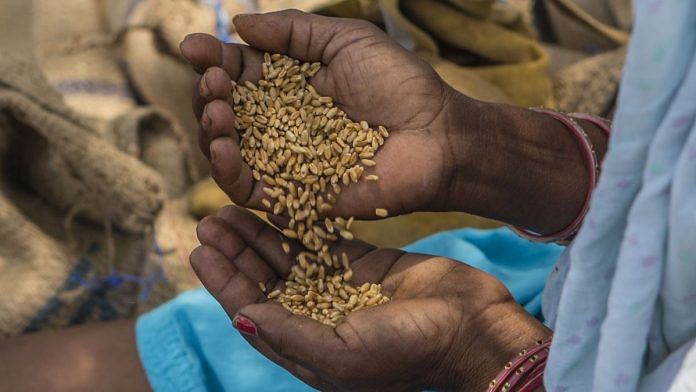New Delhi: The Narendra Modi government has reached out to Egypt to purchase India’s surplus wheat, a month after it refused to sell the grain to Turkey and Iran, ThePrint has learnt.
With the Food Corporation of India’s (FCI) godowns overflowing with wheat, the agriculture ministry has requested Egypt to add Indian wheat to its list of acceptable imports.
“India has requested Egypt to add wheat to the list of acceptable imports, considering the country is the world’s largest importer of wheat,” an official in the agriculture ministry told ThePrint.
Egypt, the official added, was already looking out to import wheat.
“Egypt’s main wheat buying agency General Authority For Supply Commodities is looking for purchase of 6,00,000 MT of soft/milling wheat for shipment for April 2020 and India is eyeing this contract,” said the official, who did not wish to be named.
Egypt, the official added, usually prefers to import soft white/red winter wheat from the United States and Canada. The country also imports wheat from Russia, Australia, Romania and Ukraine.
ThePrint has also learnt that Turkey and Iran had requested India to buy its wheat, and written to the Modi government in this regard last month. But the agriculture ministry did not respond to the proposals, sources familiar with the matter said.
Also read: Onion prices likely to fall this year as govt forecasts 7% rise in production
Surplus wheat
The FCI godowns at present have a stock of 32.8 million tonnes of wheat as compared to 27.12 million tonnes last year.
This is partly a result of the area under wheat cultivation having increased over the last year, resulting in an estimated 6.27 per cent rise in wheat production.
Added to this is the FCI’s target of selling 10 million tonnes of wheat to bulk consumers in the 2019-20 fiscal, which is over 40 per cent more than the previous year’s target of 7 million tonnes.
To increase demand, the central government even slashed the base price of wheat in its weekly auction scheme — an open market sale scheme — from 2,245 per 100 kg to Rs 2,135 per 100 kg.
“In January, when the wheat stock increased, it forced the government to cut down the base price of wheat in its weekly auction scheme. India then reached out to Egypt requesting it to consider importing our wheat,” the agriculture ministry official quoted above said.
Also read: Dilute Essential Commodities Act to boost investment, govt panel suggests
Why Iran and Turkey’s proposals were scrapped
According to documents accessed by ThePrint, Turkey and Iran wrote to the Modi government in the third week of December, requesting to buy wheat.
Turkey needs wheat to meet its increased export targets of pasta and wheat flour while Iran, reeling from the US sanctions, is desperately looking to import food grains.
According to the documents, Iran and Turkey requested to import 6,30,000 metric tonnes (MT) and 60,000 MT of wheat from India, respectively.
India, however, did not respond to their wheat import proposals, which were eventually scrapped by the end of December.
“Turkey was ready to accept Indian wheat at $300 per tonne despite it being around $50/tonne higher than Russian wheat, as it needed grain to meet its increased export targets of pasta and wheat flour,” a source in the agriculture ministry told ThePrint.
The proposals were scrapped considering the two countries’ criticism of the Modi government’s decisions to revoke Jammu and Kashmir’s special status last year and enactment of the Citizenship Amendment Act, the source added.
ThePrint contacted the agriculture ministry official spokesperson through email to confirm this but did not receive any reply. This report will be updated when the ministry responds.
In September 2019, Turkish President Recep Tayyip Erdogan had in his address at the United Nations said the Kashmir issue had to be resolved through “dialogue on the basis of justice, equity, and not through collision.”
Iran had also criticised India following the scrapping of Article 370 in J&K by the Modi government.
Also read: Rice, maize, pulses production expected to fall because of erratic 2019 monsoon




Difficult to make out where domestic politics ends and international relations begin. One would have expected MEA – now in the midst of its biggest internal reorganisation in fifty years – to caution against this approach. With godowns bursting at the seams, some of this precious wheat will become unfit for human consumption.